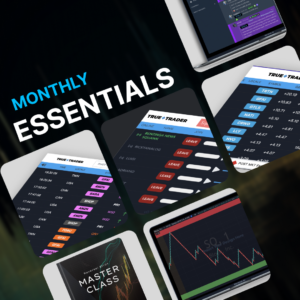There’s no doubt in my mind that we are not in the same market environment that we were in 2020 or 2021. Not even close. But the fact that both these years saw new market participants grow at staggering rates is no secret. If you’re one of the 10 million new brokerage accounts opened in 2020 and you’re wondering why making money just doesn’t seem to be working the way it used to, this article is for you.
If you’re one of the 10 million new brokerage accounts opened in 2020 and you’re wondering why making money just doesn’t seem to be working the way it used to, this article is for you.
And don’t worry, you’re not alone. In fact, unless you were trading during the GFC (great financial crisis) from ‘07-’09, it’s debatable whether you’ve truly ever experienced a bear market. And let me be clear, I am in NO WAY insinuating we are entering a bear market. But we are definitely a far cry away from the never-ending uptrend of a bull market that we have gotten accustomed to.
I’ve worked with a lot of traders that are going through rough patches and many of them have the same story. In the years prior, they would start a position, and if it went against them, they smiled because they could buy even more for even better prices. And when a market does nothing but go up, you get bailed out of that trade almost every single time. But what was really happening was the market was grooming them for their demise. One of the worst things we can have happen as traders is to be rewarded for bad habits. Those bad habits get reinforced, especially if we don’t recognize that the behavior is reckless to begin with.
But when the environment changes, the market separates out the participants that actually know how to trade from the ones that were merely a product of a bull market. Without a doubt, there is money to be made in ALL market environments. But in corrective phases, most wise participants switch to defense and know that the single most important thing is capital preservation.
Obviously some strategies work better in certain markets, but there are definitely some overarching themes that transcend styles. The first and foremost is that before any trade is ever put on, there should be a focus on the possible risk, NOT the possible reward. All trade plans need to be fully fleshed out and once the risk is defined, it needs to be accepted.
The next thing I typically remind people is that if you and price aren’t in agreement, it is YOU that is wrong. PRICE IS NEVER WRONG! You can fight the trend till you’re blue in the face, the market will break you and the second you scream UNCLE, it will finally reverse in your favor. So no need to ever let it get to that point. And while we’re on this topic, let’s also acknowledge that there is no account size too big to be snapped in half when stubbornness and the market go head to head. Think of the market as the ocean. The ocean doesn’t care how big your boat is, if it sees fit, it will flip you over and send you careening to the ocean floor. Titanic ring a bell?
The last thing that most traders I work with struggle with is a basic failure to realize that successful trading is nothing more than a numbers game. Unprofitable traders with a 70-80% winrate are a dime a dozen. You would think with such a high winrate, how is it possible they can’t make money? They all say the same thing: I always string together a ton of small wins that are then wiped out by 1 or 2 big losses. I challenge most to flip that situation upside down. Most would benefit from learning to have a bunch of small losses that are completely eclipsed by a few big winners.
I know it sounds cliche, but keep your losses small. It serves a few purposes. First, small, frequent losses are typically because you are keeping your stops nice and tight. With tight stops, you can size up enough to have your winners actually be substantial while still risking the same amount on the idea. Now obviously I’m not recommending such tight stops that it’s unreasonable and doesn’t give the trade a chance to work. But tight enough that the idea should have worked, and nothing more.
Along with tighter stops, you’ll learn to get comfortable with a lower winrate. And when you have a lower winrate, it allows you to keep your expectations low. You can breathe easy knowing that every trade you put on will most likely stop you out, and you’re ok with that. If you don’t understand how this could be possible, circle back a few paragraphs to where I was reminding you that trading is nothing more than a numbers game. You have to understand that it is completely possible to have a very successful career being right much less than 50% of the time.
Lastly, keeping losses small benefits your mindstate. It is much easier to continue to trade without being emotional if your losses are small and controlled. On the other hand, if you’re trying to operate under the pressure of a super high winrate where wins are often small and you know that a large loss can threaten a substantial amount of your gains, a big loss can mentally cripple you. Even the anxiety that comes with knowing that big loss could be looming is enough to make your decisions less than optimal. There is a serenity that comes with knowing the worst case scenario is a small loss. It allows you to enter a flow state much easier.
The bottom line is if you’re struggling right now, take a step back. Take an honest look at your trading and verify that you even have a system to begin with. Winging it may have made you money in 2020 and maybe even in 2021. But it will never amount to a career. And trading is about surviving. Your goal should be longevity. There are countless resources out there that can teach you everything from position sizing to complete strategies. But the first step is acknowledging that there is a problem. And lucky for you, the market does an amazing job at shining a light on them.
If you need guidance in any of these areas, any of the resident pros, including myself, are glad to help mentor you over at TrueTrader.NET. Wishing you all a prosperous 2022 and beyond.
Cheers,
Ricky Analog
Resident Risk Manager


